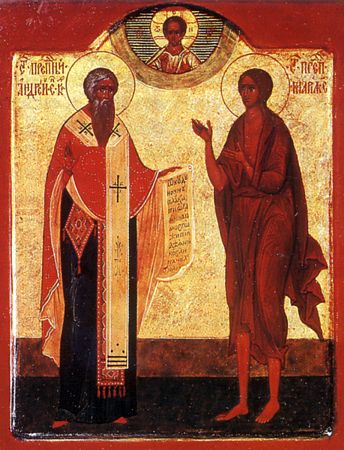|
|||
|---|---|---|---|
| This weekly bulletin insert complements the curriculum published by the Department of Christian Education of the Orthodox Church in America. This and many other Christian Education resources are available at http://dce.oca.org. | |||

As Great Lent commences, we begin chanting and singing "The Great Canon of Saint Andrew of Crete" and continue each evening in church. Saint Andrew took part in the Sixth Ecumenical Council at Constantinople in the year 680, and then served as Archdeacon at the Cathedral of Hagia Sophia in that city. Later he was consecrated as a bishop in the city of Gortineia, on the island of Crete. In addition to these important services to the Church, he wrote sermons, as well as some of the most famous hymns we have, many in praise of the Theotokos. The best-known of the hymns written by Andrew is the Canon with which we begin the season of preparation for Great and Holy Pascha. The words of the Canon challenge us in several ways. First, they contain innumerable Biblical references which may not be familiar. We don't all have the broad knowledge of the Scriptures that a good number of Andrew's hearers in earlier centuries possessed. So when the Canon verse reads, "You, my soul, have revolted from the Lord like Dathan and Abiram" we may have to look up these two men in Chapter 16 of the Book of Numbers. There we will find that they rebelled against Moses and Aaron and asked them, "Why do you exalt yourselves above the congregation...Is it a small thing that you have brought us up out of a land flowing with milk and honey; to kill us in the wilderness...?" Moses replies that it is God they are rebelling against, and Saint Andrew uses the incident as a warning to trust God and not be rebellious, "but with all your heart cry 'Spare!', that a yawning gulf of the earth may not swallow you." The Canon also challenges us to follow Biblical examples. Saint Andrew writes, "The Shunammite woman of old with right good will entertained the righteous man. But you, my soul, have taken into your house neither stranger nor traveler." This offers us a good spiritual exercise: We can consider, with serious prayer, what it means for us to "take into our house" those whom God may send, and how we will go about it.
We're also challenged to be worthy of Christ's saving acts: "You laid down Your body and blood for all, O Crucified Word; Your body in order to renew me, Your blood in order to wash me, and You did surrender Your spirit, O Christ, in order to bring me to the Father...Eden that was closed is open; things on high and below, creation and all peoples are saved and worship You." Great Lent is given to us as a time to work toward meeting these challenges. We can be assured that with God's help we are able to do so. Referring to Exodus 14:16 Saint Andrew writes: "Imagine Moses' staff striking the sea and fixing the deep as a type of the divine Cross, by which you too, my soul, can accomplish great things." |
|||
